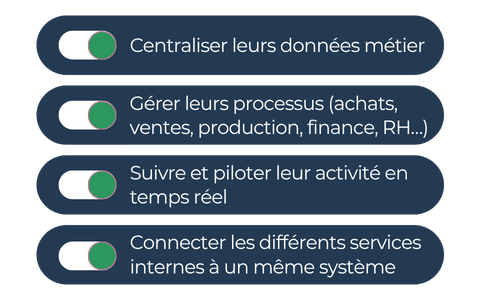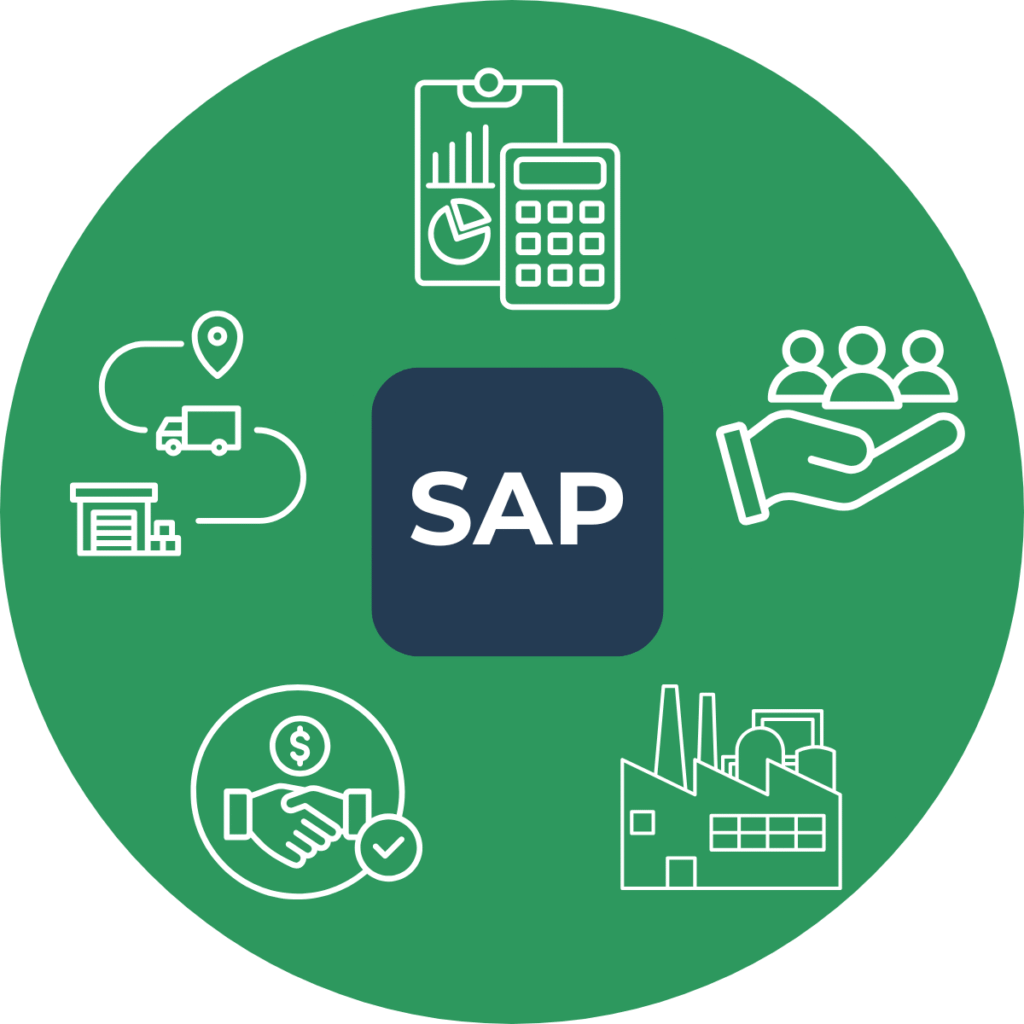The SAP guide 🗺️
Discover our complete guide to SAP solutions to improve your business management.
You are here : Home "SAP Guide
Have you ever heard the word "SAP", without really knowing what it means?
We told you about SAP solutionof management modulesof S/4HANA or even ERP softwarebut it's all a blur?
This guide is for you.
Whether you're curious, looking for a career change, working in an SAP-equipped company, or in the process of training, this page will provide you with clear answers on :
- What SAP means
- The differences between SAP software, software packages and applications
- The benefits for a company
- The roles of SAP users and consultants
- And of course, how to learn about SAP and understand its practical uses
Objective: give you a structured, simple and comprehensive overview of the SAP world and its many business solutions.
🧩 What does SAP stand for?
Let's start at the beginning: SAPstands for Systems, Applications and Products in Data Processing.
Founded in 1972, this German company is now the world leader in ERP (Enterprise Resource Planning) software solutions.
In concrete terms, SAP develops applications that enable companies to :

By extension, "SAP" is also used to designate software created by the company, such as SAP ECC, SAP Business One, or SAP S/4HANA (the most recent and powerful cloud version).
So when a company says "we work with SAP", it means that it uses an SAP ERP system to manage all or part of its activities.
Good to know:
SAP is not a single piece of software, but a whole complete suite of modular solutions that every company can configure according to its needs, its sector of activity and its business.
🧱 What is an SAP solution?
A SAP solutionis a set of software functionalities designed to meet a specific business need within a company.
For example, SAP offers integrated solutions for accounting, logistics and production planning.
These solutions are themselves made up of modules.
Each SAP module represents a functional area, like a brick in a global management system.
Here are some examples of SAP modules:
Each module handles a set of data and business processes, and interacts with the other modules to form an integrated ERP system.
A complete SAP solution is therefore the intelligent combination of these modules, adapted to the company's sector, size and strategic objectives.
🏢 What's the difference between the SAP company and "the SAP"?
It's common to hear "we're using SAP" or "I'm training on SAP", but this formulation often leads to confusion.
It's important to distinguish between two things:
SAP (the company)
SAP SE is a German technology companya world leader in business management software. It develops, sells, updates and supports its solutions worldwide.
Headquartered in Walldorf, Germany, its customers range from local SMEs to multinationals such as Airbus, Nestlé and L'Oréal.
SAP (the software or tool)
In common parlance, "SAP" actually refers to the software solutions ERP systems such as SAP S/4HANA, SAP Business One or SAP SuccessFactors (HR specialist).
So you don't work "at SAP" because you use their software, any more than you work at Microsoft because you use Excel.
💡 To remember:
When a company says "we use SAP", it means that it uses one or more ERP modules developed by SAP SE to manage its business.
And when a professional "learns about SAP", he or she learns to use these tools, to understand their functions, data and integrated processes.
🛠️ What are SAP modules for?
Visit SAP modules are at the heart of the way companies run their ERP systems. Each module responds to a key organizational function, automating tasks, structuring data flows and facilitating decision-making.
Let's look at a few concrete examples:
- Visit FI module enables finance departments to manage general accounting, balance sheets and tax obligations with precision.
- Visit MM module enables purchasing departments to track supplier orders, goods receipts and inventory management.
- Visit SD module helps sales teams manage quotations, orders, deliveries and invoicing.
- Visit HCM module offers a complete solution for managing employees, working hours, skills and payroll.
SAP's power lies in its ability to interconnect these modules, providing a cross-functional view of all departments within a company.
SAP solutions like S/4HANA combine these modules in an integrated, modern architecture, often hosted in the cloud, to meet the evolving needs of organizations: cost reduction, speed of execution, data reliability, regulatory compliance...
In short: SAP modules are functional building blocks; SAP solutions are coherent packages that can be adapted to each company's business, sector (industry, distribution, finance, etc.) and strategic challenges.
💻 The difference between SAP software and software packages
In everyday language, "software" and "software package" are often used synonymously.
But in the world of SAP (and ERP in general), the nuance is important.
SAP is more than just software. It's a complete, modular, customizable and interconnected ERP system.
With SAP, you don't just manage invoicing or HR: you manage the entire value chain, from customer request to production, delivery, accounting and performance analysis.

Software
Software is a computer application designed to meet a specific need (e.g. Excel for calculations, Outlook for e-mail).

Software package
A software package (or enterprise resource planning - ERP) is a coherent set of integrated software applications covering all a company's management processes.
That's why we talk about SAP software packages (especially for solutions like SAP S/4HANA): because SAP is deeply integrated into a company's information system, becoming a central management tool.
👥 Who are the users of SAP solutions?
SAP solutions are not just for IT specialists. They are designed to be used by various profiles within the company, depending on their role, department and need for access to business information.
Here are a few examples of typical SAP users:
Accountants
who use FI/CO modules to manage accounting entries, monthly closings and VAT.
Purchasing managers
who use the MM module to place orders, track deliveries and negotiate prices.
The sales team
who manage quotations, sales orders and invoicing via the SD module.
HR
who use HCM to track working hours, absences and payroll.
Project managers
who need a consolidated view of data to make decisions.
SAP consultants
who configure, optimize and support system implementation and upgrades.
In recent solutions such as SAP S/4HANA, the user experience has been rethought with more intuitive interfaces (Fiori), so that each business has a simplified and relevant view according to its needs.
🏢 How can an SAP solution help a company?
Adopting an SAP solution is much more than installing software: it's integrating a global management system, capable of profoundly transforming a company's performance.
Here are a few concrete benefits for an organization:
- Data centralization no more scattered Excel files! SAP allows you to consolidate all your data in a single file. single basisconsistent and up-to-date.
- Process automation Repetitive tasks are simplified, human errors are reduced, and lead times are optimized.
- Full traceability Every operation (order, invoice, payment) is recorded and logged. Ideal for auditing and compliance.
- 360° vision of your business With a single click, managers can monitor key indicators in real time and quickly adjust their strategy.
- Cost reduction By improving process efficiency, SAP helps you save time, money and resources.
- Sector adaptability SAP offers versions adapted to specific specific sectors (industry, distribution, finance, public services...).
Above all, a well-deployed SAP solution gives companies a new level of agility: they can grow, transform, merge or digitize, without being held back by their information systems.
In short: SAP is a strategic lever for companies that want to move towards modern, integrated, performance-oriented management.
👨💼 The SAP consulting profession
The SAP consultant is a key professional in the implementation, optimization and smooth running of a company's SAP system.
There are two main families of consultants:
The functional consultant, who knows the business processes (finance, purchasing, production, HR, etc.) and configures the system to meet the company's specific needs.
The technical consultant, involved in the architecture, development, integration and sometimes administration of the SAP system.
Whether working in-house, for a consulting firm or on a freelance basis, SAP consultants are involved in all stages of the project: scoping, configuration, testing, training and support.
He or she must understand business issues, configure SAP modules according to internal rules, and support users in their day-to-day work.
With the increasing adoption of SAP S/4HANA and the cloud, demand for this job is growing fast. It's a solid, well-paid career, with opportunities in France and abroad.
🎓 SAP certifications
Visit SAP certification is official recognition of your expertise. It may relate to a specific module (such as FI or MM), a solution (such as SuccessFactors or SAP Analytics Cloud), or a system version, such as SAP S/4HANA.
Obtaining certification is proof that you have mastered a functional or technical domain. It's also an asset when it comes to developing your career, gaining legitimacy with recruiters, or negotiating a more ambitious freelance assignment.
But beware: certification is not a magic shortcut. It must be seriously prepared, often after a period of practical training or project experience. It confirms skills already acquired, rather than teaching them.
You get the idea: SAP is more than just software. It is a strategic platform that structures the management of thousands of companies worldwide.
Understanding SAP solutions, their modules, their concrete uses and the professions they mobilize, opens up a world of opportunities: in-house positions, consulting, retraining, or international freelancing.
This guide is a first step. If you'd like to go further, take action, or start training in a serious, guided way, Key User Training is here to support you, at your own pace.
SAP consultant training
A successful career transition: How I went from being a maintenance technician to an SAP consultant - increasing my level of income and comfort.
➡️ An excellent starting point for discovering this profession and understanding its requirements.
SAP Expert Training
Obtain the salary and status of an Expert : Be at the heart of ambitious projects, gain recognition and reap the rewards of your efforts and involvement, and rightly so.
➡️ Ideal for deepening your skills and aiming for a certification.
Become a Freelance SAP Consultant
Build and develop a stable and profitable SAP freelance career: Become a freelancer, find more customers, increase your rates and establish a perfect work-life balance.
➡️ One solution to transform your SAP know-how into work independent.

